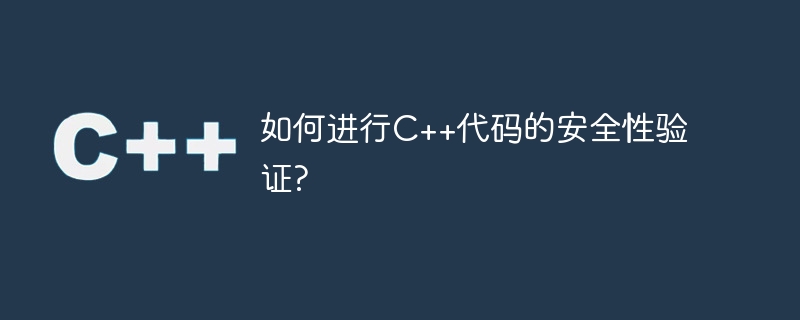Home >Backend Development >C++ >How to perform security verification of C++ code?
How to perform security verification of C++ code?
- WBOYWBOYWBOYWBOYWBOYWBOYWBOYWBOYWBOYWBOYWBOYWBOYWBOriginal
- 2023-11-02 10:02:32976browse

C is a widely used programming language and is widely used in various software development. However, due to C's syntactic flexibility and low-level nature, the security of its code is more vulnerable to attacks. In order to protect the security of the code, security verification of C code has become increasingly important.
The security of C code can be verified from many aspects:
1. Memory security verification
Memory allocation and management in C is a common security risk . For example, when using dynamic memory allocation, if you do not pay attention to the release of memory, it will lead to memory leaks. If these vulnerabilities are exploited by malicious attackers, they can lead to major security incidents. Therefore, memory safety verification is an important part of code security verification.
You can verify the memory safety of C code by using memory management tools. For example, Valgrind is a commonly used memory management tool. It can monitor problems such as memory leaks, memory write out of bounds, and use of uninitialized memory when the program is running, and provide detailed diagnostic information.
2. Code quality verification
The quality of C code not only affects the readability and maintainability of the code, but is also directly related to the security of the code. Code quality verification can be performed through code review, static code analysis, etc.
Code review refers to carefully examining the code line by line to identify and correct code quality problems. Code reviews can occur during development or after code is completed. It should be noted that code review requires a professional team to perform, requires a lot of time and resources, and the results may not meet expectations.
Static code analysis refers to identifying and correcting potential problems in the code by analyzing the syntax and structure in the source code. Static code analysis tools can detect problems such as memory leaks, use of uninitialized variables, and mutual coverage between class members in the code, effectively improving code quality.
3. Vulnerability Detection
C code is easily exploited by attackers due to its underlying characteristics and flexibility of syntax. Common vulnerabilities include buffer overflow, integer overflow, format string vulnerabilities, etc. To protect code security, it is necessary to detect and fix these vulnerabilities.
Vulnerability detection can be performed by using vulnerability scanning tools or manual code auditing. Vulnerability scanning tools can quickly scan your code for vulnerabilities, but they usually cannot cover all vulnerabilities. Manual code auditing requires careful inspection of the code and can more accurately identify vulnerabilities. It is recommended to actively detect and repair vulnerabilities during the development stage to reduce security risks caused by vulnerabilities.
4. Encryption and authentication
C code may involve the processing of sensitive information such as encryption and authentication. Encryption can ensure that sensitive information is not stolen or tampered with, and authentication can confirm the authenticity and integrity of the information. Encryption and authentication can be achieved through the use of cryptographic techniques and digital signatures.
It is recommended to follow industry standards and best practices when using cryptography and digital signatures to ensure the security of encryption and authentication. At the same time, you need to pay attention to the security of passwords and digital signatures to avoid attacks and cracks.
To sum up, the security verification of C code needs to be carried out from many aspects. Aspects such as memory safety verification, code quality verification, vulnerability detection, and encryption and authentication all require attention. Only by comprehensively considering all aspects can the security of C code be ensured.
The above is the detailed content of How to perform security verification of C++ code?. For more information, please follow other related articles on the PHP Chinese website!

